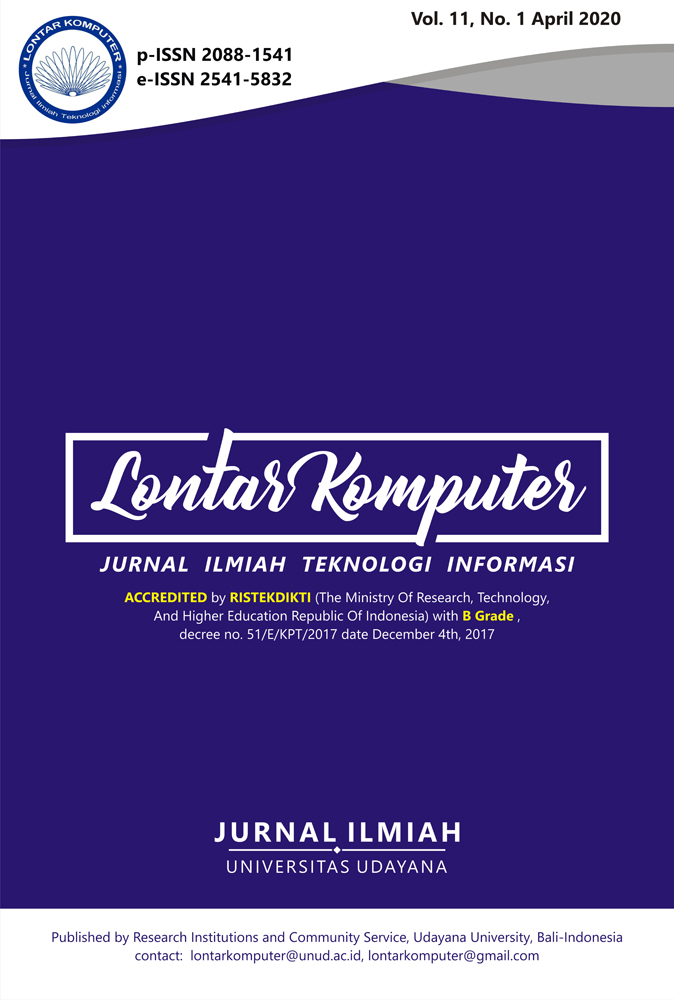Gift-exchange Game Theory for Gamification on Digital Data Collection Systems
Abstract
Gamification is widely used to increase user motivation by applying game elements to things that are not game-based. For example, in a data collection system. Gamification is used to increase the motivation of users to want to get involved. The elements of the game that are often used are rewards, badges, and leaderboards. But some implementations have not been able to ensure increased user motivation. Gamification applied needs to consider the use of game theory. Game theory is used to determine the right gamification model for digital data collection. This paper discusses the application of gift-exchange-games (GEG) in the gamification of digital data collection systems. GEG is used to model player interactions in the gamification system. GEG implementation of Gamification can improve user involvement in the system. This theoretical model can later be used for a more efficient data collection system development platform.
Keywords: gamification, game theory, data collection, gift-exchange-game, geg
Downloads
References
[2] D. Basten, “Gamification,” IEEE Software., vol. 34, no. 5, pp. 76–81, 2017.
[3] S. Deterding and D. Dixon, “Gamification : Using Game Design Elements in Non-Gaming Contexts,” in CHI 2011: Conference on Human Factors in Computing Systems, pp. 5–8, 2011.
[4] J. Frith, “Turning life into a game: Foursquare, gamification, and personal mobility,” Mobile Media & Communications., vol. 1, no. 2, pp. 248–262, 2013.
[5] K. Werbach and D. Hunter, For The Win: How Game Thinking Can Revolutionize Your Business. Philadelphia: Wharton Digital Press, 2012.
[6] Y. Allsop and J. Jessel, “Teachers’ Experience and Reflections on Game-Based Learning in the Primary Classroom,” International Journal of Game-Based Learning, vol. 5, no. 1, pp. 1–17, 2015.
[7] A. P. Markopoulos, A. Fragkou, P. D. Kasidiaris, and J. P. Davim, “Gamification in engineering education and professional training,” International Journal of Mechanical Engineering Education, vol.43, issue 2, pp.118-131, 2015.
[8] A. F. Maturo and V. Moretti, Digital Health and the Gamification of Life: How Apps Can Promote a Positive Medicalization. Emerald Publishing Limited, 2018.
[9] S. Nicholson, “Strategies for meaningful gamification: Concepts behind transformative play and participatory museums.,” Meaningful Play 2012, no. 1999, pp. 1–16, 2012.
[10] J. Weber, “Gaming and Gamification in Tourism: 10 Ways to Make Tourism MorePlayful. Best Practice Report,” Digital Tourism Think Tank, pp. 4–14, 2014.
[11] F. Xu, J. Weber, and D. Buhasil, “Gamification in Tourism,” in Information and Communication Technologies in Tourism 2014, vol. 4, no. January, 2013.
[12] A. Kelly, Decision Making Using Game Theory: An Introduction for Managers. 2003.
[13] J. Axelsson, “Game theory applications in systems-of-systems engineering: A literature review and synthesis,” Procedia Computer Science, vol. 153, pp. 154–165, 2019.
[14] H. Azgomi and M. K. Sohrabi, “A game theory based framework for materialized view selection in data warehouses,” Engineering Applications of Artificial Intelligence, vol. 71, no. February, pp. 125–137, 2018.
[15] R. Casado-Vara, F. Prieto-Castrillo, and J. M. Corchado, “A game theory approach for cooperative control to improve data quality and false data detection in WSN,” International Journal of Robust and Nonlinear Control, vol. 28, no. 16, pp. 5087–5102, 2018.
[16] C. T. Do et al., “Game theory for cyber security and privacy,” ACM Computing Surveys, vol. 50, no. 2, pp. 30–37, 2017.
[17] Schapire, Robert E. and Indraneel Mukherjee. “Game theory and optimization in boosting.” 2011.
[18] MYERSON, ROGER B. Game Theory: Analysis of Conflict. Cambridge, Massachusetts; London, England: Harvard University Press, 1991. Accessed Jan 1, 2020. www.jstor.org/stable/j.ctvjsf522..
[19] M. Apagodu, D. Applegate, N. J. . Sloane, and D. Zeilberger, “Analysis of the gift exchange problem,” arXiv math.CO, pp. 1–14, 2017.
[20] G. Umbhauer, Game Theory and Exercises. Routledge, 2016.
[21] A. Mora, D. Riera, C. Gonzalez, and J. Arnedo-Moreno, “A Literature Review of Gamification Design Frameworks,” 2015 7th International Conference on Games and Virtual Worlds for Serious Applications (VS-Games), September, pp.1-8, 2015.
[22] J. Hamari, “Framework for Designing and Evaluating Game Achievements,” Proceedings of DiGRA 2011 Conference: Think Design Play, pp. 20, 2011.
[23] Supriyanto, J. Fahana and S. Handoko, "Gamification to Improve Digital Data Collection in Ecotourism Management," 2018 2nd East Indonesia Conference on Computer and Information Technology (EIConCIT), Makassar, Indonesia, 2018, pp. 139-142..
The Authors submitting a manuscript do so on the understanding that if accepted for publication, the copyright of the article shall be assigned to Jurnal Lontar Komputer as the publisher of the journal. Copyright encompasses exclusive rights to reproduce and deliver the article in all forms and media, as well as translations. The reproduction of any part of this journal (printed or online) will be allowed only with written permission from Jurnal Lontar Komputer. The Editorial Board of Jurnal Lontar Komputer makes every effort to ensure that no wrong or misleading data, opinions, or statements be published in the journal.
 This work is licensed under a Creative Commons Attribution 4.0 International License.
This work is licensed under a Creative Commons Attribution 4.0 International License.























